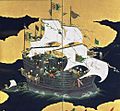Globalization facts for kids
Globalization is about how countries and people around the world become more connected and similar. It touches on many parts of life, like how we buy and sell things (economics), how we use new tools (technology), how countries work together (politics), and even what we wear or watch (culture). People have different ideas about globalization. Some think it helps everyone, while others believe it can cause problems for some.

Contents
What is Globalization?
Globalization describes how countries and people interact and become more connected. It has several important parts:
Economic Globalization
Economic globalization is when countries become more like one big global market. This makes international trade easier. In recent times, many countries have agreed to lower tariffs. Tariffs are like taxes on goods that are brought in from other countries.
The Internet and other ways of communicating also make it simpler for people to buy and sell products from anywhere in the world. This is a big part of economic globalization. It means that what happens in one country's economy can quickly affect others.
Political Globalization
Political globalization is about how countries and big groups like the United Nations can influence the whole world. The United Nations is a good example because most countries are members. This organization can set rules and even use economic sanctions. Sanctions mean that member countries might stop trading or talking with a country that doesn't follow the rules. This encourages countries to work together.
Cultural Globalization
Cultural globalization is when cultures around the world start to become more alike. This is called being homogeneous. For example, many people globally use the Latin alphabet. They might also wear T-shirts and jeans. Watching Hollywood movies and other media is another common activity worldwide. This shows how ideas and styles can spread across borders.

Why Some People Criticize Globalization
Some people, like Noam Chomsky, worry that globalization mostly helps rich people get richer. They feel it can make poor people poorer.
Job Concerns
One concern is Offshore outsourcing. This is when companies hire workers in other countries where labor is cheaper. This can sometimes mean that people in the company's home country lose their jobs.
Impact on Poorer Nations
Some experts, like Joseph Stiglitz, have said that big international groups, such as the World Bank and the International Monetary Fund (IMF), have made it harder for poorer nations to become richer.
Global Problems
Globalization also means that problems from one country can quickly spread. For example, the Global Financial Crisis of 2008 started in the United States. But it soon affected the entire world.
Loss of Local Culture
Many critics also feel that globalization leads to big global brands, like Coca-Cola and McDonald's, taking over smaller local shops. They worry that powerful countries have too much influence on world culture. For instance, the United States exports a lot of its culture. Some believe this can hurt unique local cultures around the world.
Why Some People Support Globalization
Others, like Thomas Friedman, believe that globalization can bring people together. They think it can make everyone richer without getting rid of local cultures.
Peace and Prosperity
People who support globalization also believe it makes war less likely. This is because war is bad for business and trade. Francis Fukuyama even argued that globalization could lead to a world system that would end wars.
Helping Poorer Nations
Many believe that globalization helps poorer nations by bringing them new businesses and opportunities. A report by the World Bank stated that poverty in India and Indonesia was cut in half because of globalization. The report also found that people in poorer nations were living longer and better lives. This was because they were earning more money.
Related pages
Images for kids
-
Portuguese carrack in Nagasaki, 17th-century Japanese Nanban art
-
The Silk Road in the 1st century
-
The 1843 launch of the Great Britain, the revolutionary ship of Isambard Kingdom Brunel
-
During the 19th and early 20th centuries, the United Kingdom was a global superpower.
-
D.H. Comet, the world's first commercial jet airliner, entered service in 1949
-
With a population of 1.4 billion, China is the world's second-largest economy.
-
Dividends worth CZK 289 billion were paid to the foreign owners of Czech companies in 2016.
-
Shakira, a Colombian multilingual singer-songwriter, playing outside her home country
-
Use of chili pepper has spread from the Americas to cuisines around the world, including Thailand, Korea, China, and Italy.
-
Scheduled airline traffic in 2009
-
2010 London Youth Games opening ceremony. About 69% of children born in London in 2015 had at least one parent who was born abroad.
-
The European Union–Mercosur free trade agreement, which would form one of the world's largest free trade areas, has been denounced by environmental activists and indigenous rights campaigners.
-
Hu Jintao of China and George W. Bush meet while attending an APEC summit in Santiago de Chile, 2004
-
As of 2017, there were 2,754 U.S. dollar billionaires worldwide, with a combined wealth of over US$9.2 trillion.
-
Of the factors influencing the duration of economic growth in both developed and developing countries, income equality has a more beneficial impact than trade openness, sound political institutions, and foreign investment.
-
Worlds regions by total wealth (in trillions USD), 2018
-
Barack Obama and Dmitry Medvedev after signing the New START treaty in Prague, 2010
-
Anti-TTIP demonstration in Hannover, Germany, 2016
-
World Bank Protester, Jakarta, Indonesia
-
Differences in national income equality around the world as measured by the national Gini coefficient, as of 2018.
-
Countries by total wealth (trillions USD), Credit Suisse
-
Immigrant rights march for amnesty, Los Angeles, on May Day, 2006
-
Deforestation of the Madagascar Highland Plateau has led to extensive siltation and unstable flows of western rivers.
See also
 In Spanish: Globalización para niños
In Spanish: Globalización para niños
 | Aaron Henry |
 | T. R. M. Howard |
 | Jesse Jackson |




























